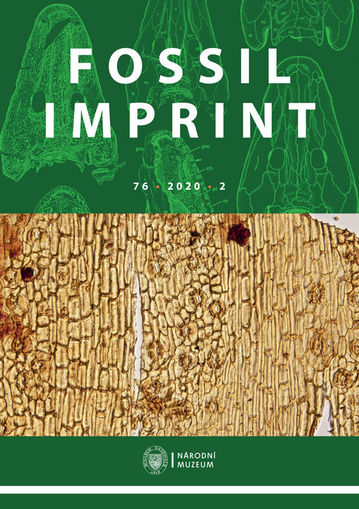
2020/76/2
ISSN : 2533-4050 (tisk), 2533-4069 (online)
Editor in Chief : Jiří Kvaček
Editor in Chief : Jiří Kvaček
Winged fruits of rutaceous affinity from the Eocene of western North America
Steven R. Manchester, Kory A. Disney, Kasey K. Pham
A new kind of fin-winged fruit is recognized from lacustrine shales of the early Eocene Tepee Trail Formation of northwestern Wyoming and from the middle Eocene Clarno Formation of central Oregon, USA. The fruits are obovate with five thick lateral wings, borne on a thick pedicel and bearing scars…
A new stereospondylomorph, Korkonterpeton kalnense gen. et sp. nov., from lower Permian of the Czech Krkonoše Piedmont Basin and a redescription of Intasuchus silvicola from the lower Permian of Russia (Temnospondyli, Amphibia)
Ralf Werneburg, Stanislav Štamberg, Jean-Sébastien Steyer
A new temnospondyl, Korkonterpeton kalnense gen. et sp. nov., is described on the basis of an almost complete specimen from the lover Permian Prosečné Formation of the Czech Krkonoše Piedmont Basin. The exceptional preservation of the holotype allows a detailed description of the cranial and…
First record of the stem amniote Discosauriscus (Seymouriamorpha, Discosauriscidae) from the Krkonoše Piedmont Basin (the Czech Republic)
Jozef Klembara, Marika Mikudíková, Stanislav Štamberg, Miroslav Hain
The first record of the seymouriamorph stem amniote Discosauriscus from the Krkonoše Piedmont Basin (the Czech Republic) is described. The specimen is identified as D. pulcherrimus on the basis of the following features which are absent in D. austriacus: 1) the pointed tip of the ventrolateral…
Listriodon skull from the late middle Miocene of Nebisuyu (Çanakkale – MN 8) Turkey
Martin Pickford, Tanju Kaya, Serdar Mayda
The late middle Miocene (MN 8) sediments at Nebisuyu, in the southwestern extremity of the Gelibolu Peninsula, Turkey, yielded remains of a large individual of Listriodon splendens: a skull lacking the premaxillae but containing both cheek tooth rows, and a detached left maxilla fragment containing…
A new species of the genus Tumidopteris Naugolnykh from the Permian of the Pechora Cis-Urals, Russia
Serge V. Naugolnykh
The paper considers a new species of gleicheniacean fern Tumidopteris astra Naugolnykh sp. nov. from the Lower Permian (Kungurian) and the Middle Permian (Roadian) deposits of the Pechora coal-basin, Russia. The new species is characterized both by macromorphology of the fertile and sterile pinnules…
Multiparted, apocarpous flowers from the Early Cretaceous of eastern North America and Portugal
Else Marie Friis, Peter R. Crane, Kaj Raunsgaard Pedersen
Three new genera, Atlantocarpus, Lambertiflora and Mugideiriflora, are described from the Early Cretaceous of North America and Portugal based on floral structures with multicarpellate and apocarpous gynoecia that have been studied using scanning electron microscopy and synchrotron radiation X-ray…
A new Oligocene flora from Ludvíkovice near Děčín (České středohoří Mts., the Czech Republic)
Vasilis Teodoridis, Zlatko Kvaček, Miroslav Radoň, Vladislav Raprich, Angela A. Bruch
A recently recovered site of plant macrofossils, Ludvíkovice, in the České středohoří Mts. is situated on Sokolí vrch hill, belonging to the Děčín Formation (radiometrically dated to 30.8–24.7 Ma), according to regional stratigraphy. The flora has yielded a fern, Rumohra recentior, and several…
Two cycads Nilssonia mirovanae sp. nov. and Pseudoctenis babinensis J.Kvaček from the Cenomanian of the Bohemian Cretaceous Basin (the Czech Republic) as indicators of water stress in the palaeoenvironment
Jana Čepičková, Jiří Kvaček
Nilssonia mirovanae sp. nov. is described from the Late Cretaceous Cenomanian of the Bohemian Cretaceous Basin. It comes from the best-exposed portion of the Peruc-Korycany Formation, in the Pecínov quarry, west of Prague, the Czech Republic. Although preserved only as a fragment of a pinna, it…
Small early Miocene listriodont suid (Artiodactyla: Mammalia) from Sabuncubeli (Manisa, SW Anatolia), Turkey
Martin Pickford, Tanju Kaya, Erhan Tarhan, Derya Erylmaz, Serdar Mayda
Turkey is known for the wealth of fossil suids found in deposits of middle Miocene, late Miocene and Plio-Pleistocene levels but material of this family from early Miocene and Palaeogene deposits is rare in the country, one of the few published occurrences being from Şemsettin (Kumartaş Formation,…
